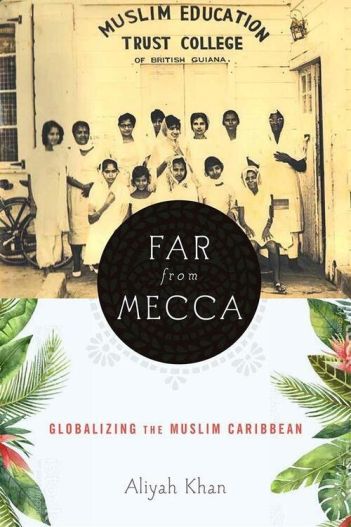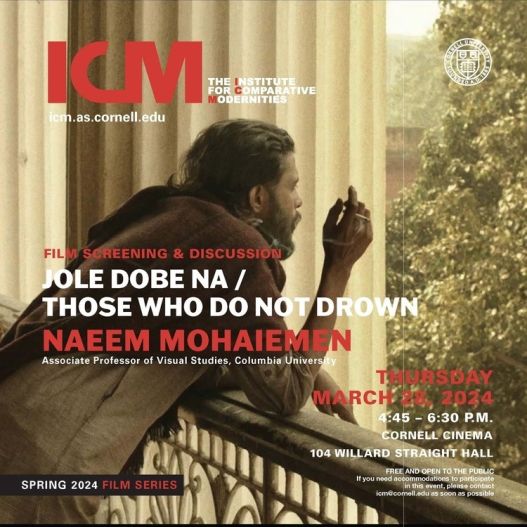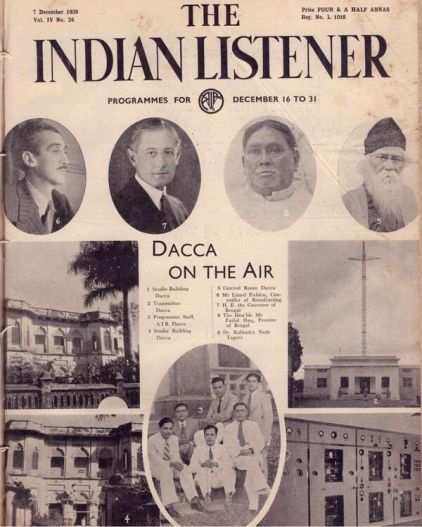South Asia Program
Religions on the Move series: "Diasporic Devotions"

March 21, 2024
5:00 pm
A. D. White House, Guerlac Room
Associate Professor Aliyah Khan from the University of Michigan will give a talk titled "Diasporic Devotions: The Indo-Caribbean Islamic Qasida and Gendered Performance" on Thursday, March 21.
The Indo-Caribbean Islamic qasida is a diasporic devotional song that propagates Indian subcontinental Islamic ritual practices and preserves the use of Urdu in the post-indentureship Caribbean through performances of religious authenticity. But it is simultaneously creolized in transliteration and translation, in part through Muslim women’s participation in public worship. This talk explores the gendered and racialized performances, songbook and vinyl record dissemination, and transliterated creolization of Urdu qasida poetic, devotional praise songs brought to Trinidad and Guyana by Indian Muslim indentured laborers in the nineteenth and early twentieth centuries.
In this lecture, Khan focuses on the evolution of women’s public devotional and competitive performances of qasidas in the Indo-Caribbean Muslim context of sectarian Sunni and Ahmadi differences, local engagement with global revivalist principles of bid’a (innovation), and the controversial emergence of women’s performance categories in new qasida competitions supported by nation-states and commercial interests. Indo-Caribbean women’s qasida performances, Khan argues, lie at the intersection of Indo-Caribbean postcolonial political identity—which is historically and continually defined by Indian women’s culturally “proper” dress, sexuality, and public behavior in visible opposition to Afro-Caribbean women—and worldwide Muslim debates and tensions over global and local iterations of Islam.
Dr. Aliyah Khan is an associate professor in the University of Michigan (U-M) Department of Afroamerican and African Studies and the Department of English Language and Literature. She is also the Director of the U-M Global Islamic Studies Center (GISC). Dr. Khan specializes in postcolonial Caribbean literature and the contemporary literature of the Muslim and Islamic worlds, with a particular focus on the intersections of race, gender, and Islam in the hemispheric Americas, including in immigrant communities in North America. She has also presented and taught widely in the field of Muslim representation in comics and graphic novel. She is on the editorial board of Bloombsbury Critical Guides in Comics Studies.
Far from Mecca: Globalizing the Muslim Caribbean (Rutgers University Press and University of the West Indies Press 2020), Dr. Khan’s first book, is the first academic monograph on the literature, history, and music of Caribbean Islam, focusing on Guyana, Trinidad, and Jamaica, and on enslaved Muslim West Africans, indentured Indian colonial sugar plantation laborers, and their Muslim Caribbean descendants. Far from Mecca garnered honorable mention in the 2020-2021 Modern Language Association Prize for a first book. Dr. Khan is currently conducting research for a literary and musical book project on Caribbean hurricanes and climate change, including religious responses, reparations debates, and other community-oriented environmental mitigation strategies.
This lecture is part of the 'Religions on the Move' lecture series sponsored by the Religious Studies Program which is supported by a grant from Cornell University’s Migrations Global Grand Challenge and the Mellon Foundation’s Just Futures Initiative. Additional support from the Latin American and Caribbean Studies Program, Society for the Humanities, Comparative Muslim Societies Program, and South Asia Program.
Additional Information
Program
Einaudi Center for International Studies
Latin American and Caribbean Studies
South Asia Program
FLIP Teacher Orientation

February 5, 2024
3:00 pm
Uris Hall, G02
The Einaudi Center’s Foreign Language Introduction Program (FLIP) is heading into local communities to teach children about world cultures and languages. FLIP aims to connect our diverse Cornell community to K-12 students at local schools, libraries and community centers in Upstate New York. Cornell volunteer teachers will have the opportunity to share short introductory lessons on the foreign languages and cultures they are passionate about. Volunteer teachers should have at least an intermediate knowledge of their chosen language.
Register to attend either the Feb. 1 orientation in person or the Feb. 5 orientation over Zoom.
Additional Information
Program
Einaudi Center for International Studies
East Asia Program
Southeast Asia Program
Latin American and Caribbean Studies
Institute for African Development
Institute for European Studies
South Asia Program
Information Session: Global Internships in Africa

January 30, 2024
4:45 pm
Uris Hall, G08
The Institute for African Development (IAD) offers 6-8 week summer internships that let you undertake challenging practical fieldwork in Ghana, Zambia, or Liberia. If you're a sophomore or junior, join this info session to find out how you can apply. Applications for Global Internships are due February 1.
Register for the information session.
***
The Mario Einaudi Center for International Studies hosts info sessions for graduate and for undergraduate students. To learn more about funding opportunities, international travel, research, and internships, view the full calendar for spring semester sessions.
Additional Information
Program
Einaudi Center for International Studies
Reppy Institute for Peace and Conflict Studies
East Asia Program
Southeast Asia Program
Latin American and Caribbean Studies
Institute for African Development
Institute for European Studies
South Asia Program
Cornell Concert Series presents: TISRA

March 22, 2024
7:30 pm
Bailey Hall
Tabla virtuoso Zakir Hussain is proud to present TISRA (three) with two of India’s finest young musicians, Sabir Khan and Debopriya Chatterjee. This trio is comprised of tabla (drum), sarangi (strings), and bansuri (bamboo flute), a combination not often heard on the classical stage. Sarangi and bansuri each have roots in ancient India and its mythology; both are also folk instruments. TISRA showcases rich folk and classical traditions: the musical influence of Rajasthani nomads has been heard far beyond the borders of India, and Uttar Pradesh incorporated folk music forms of Nepal, Bhutan, and Tibet into its music. This colorful mix, combined with Indian classical music and the rich rhythm repertoire of Punjab, makes for a compelling offering that TISRA brings to audiences in the United States.
“Zakir Hussain … Virtuosity that is barely to be believed.” – Washington Post
Additional Information
Program
South Asia Program
Information Session: Foreign Language and Area Studies Fellowships and Rare and Distinctive Language Fellowships

February 7, 2024
4:45 pm
Uris Hall, G08
Learn one of more than 50 languages offered at Cornell with a Foreign Language and Area Studies Fellowship or Rare and Distinctive Language Fellowship. Opportunities are open to both undergraduate and graduate students.
FLAS fellowships support students studying modern South Asian and Southeast Asian languages and related area studies. Funding is offered in collaboration with the Einaudi Center’s South Asia and Southeast Asia Programs.
RAD fellowships support students studying modern languages that are less frequently taught in the United States. Funding is offered by the Einaudi Center for intensive summer language study.
Can’t attend? Contact flas@einaudi.cornell.edu.
***
The Mario Einaudi Center for International Studies hosts info sessions for graduate and for undergraduate students. To learn more about funding opportunities, international travel, research, and internships, view the full calendar for spring semester sessions.
Additional Information
Program
Einaudi Center for International Studies
Southeast Asia Program
South Asia Program
Reppy Institute for Peace and Conflict Studies
Jole Dobe Na / Those Who Do Not Drown (2020) Naeem Mohaiemen

March 28, 2024
4:45 pm
Cornell Cinema, Willard Straight Hall
A screening of Jole Dobe Na / Those Who Do Not Drown (2020) followed by a conversation with filmmaker Naeem Mohaiemen.
Naeem Mohaiemen’s film Jole Dobe Na / Those Who Do Not Drown (2020) was conceived in response to a prompt given by Delhi-based artist group Raqs Media Collective to think about the afterlife of caregivers. The film was was commissioned in 2019 by the Yokohama Biennale and Bildmuseet Umea, and completed during the first months of 2020 lockdown.
In an empty hospital in Kolkata, a man faces protocols of blood, a subtly discriminatory office, and a vacant operating theater. His mind is on a loop of the last months of his wife’s life, when a quiet argument developed. When is the end of pharma-medical care; whose life is it anyway? They were an estranged couple, thrown back into intimacy by an unknown illness. Even in a dreamworld of his making, the paranoia of infection is twinned with a hesitant intimacy.
The film revisits themes from the earlier film Tripoli Cancelled (2017)–family unit as locus for pain-beauty dyads, abandoned buildings as staging ground for lost souls, and the necessity of small prevarications to keep on living. In Tripoli, the boredom of daily life is punctuated by letters to an invisible wife, and endless readings of Richard Adams’ dark children’s fable Watership Down (1972). In Jole, a looping memory of final days is obstinately kept alive by the husband, and the book readings are from Syed Mujtaba Ali’s stories of Europe between the two world wars.
See the trailer.
Naeem Mohaiemen combines films, photography, drawings, and essays to research utopia-dystopia slippage in decolonizing South Asia after 1945. He is Associate Professor of Visual Arts and Head of the Photography Concentration at the School of Arts, Columbia University.
Additional Information
Program
South Asia Program
Information Session: Fulbright U.S. Student Program for Undergraduates

March 13, 2024
4:45 pm
The Fulbright U.S. Student Program supports U.S. citizens to study, conduct research in any field, or teach English in more than 150 countries. Students who wish to begin the program immediately after graduation are encouraged to start the process in their junior year. Recent graduates are welcome to apply through Cornell.
The Fulbright program at Cornell is administered by the Mario Einaudi Center for International studies. Applicants are supported through all stages of the application and are encouraged to start early by contacting fulbright@einaudi.cornell.edu.
Register for the information session. Can’t attend? Contact fulbright@einaudi.cornell.edu.
***
The Mario Einaudi Center for International Studies hosts info sessions for graduate and for undergraduate students. To learn more about funding opportunities, international travel, research, and internships, view the full calendar for spring semester sessions.
Additional Information
Program
Einaudi Center for International Studies
Reppy Institute for Peace and Conflict Studies
East Asia Program
Southeast Asia Program
Latin American and Caribbean Studies
Institute for African Development
Institute for European Studies
South Asia Program
Information Session: Fulbright U.S. Student Program for Undergraduates

February 12, 2024
4:45 pm
The Fulbright U.S. Student Program supports U.S. citizens to study, conduct research in any field, or teach English in more than 150 countries. Students who wish to begin the program immediately after graduation are encouraged to start the process in their junior year. Recent graduates are welcome to apply through Cornell.
The Fulbright program at Cornell is administered by the Mario Einaudi Center for International studies. Applicants are supported through all stages of the application and are encouraged to start early by contacting fulbright@einaudi.cornell.edu.
Register for the information session. Can’t attend? Contact fulbright@einaudi.cornell.edu.
***
The Mario Einaudi Center for International Studies hosts info sessions for graduate and for undergraduate students. To learn more about funding opportunities, international travel, research, and internships, view the full calendar for spring semester sessions.
Additional Information
Program
Einaudi Center for International Studies
Reppy Institute for Peace and Conflict Studies
East Asia Program
Southeast Asia Program
Latin American and Caribbean Studies
Institute for African Development
Institute for European Studies
South Asia Program
Information Session: Fulbright Opportunities for Graduate Students

February 5, 2024
4:45 pm
The Fulbright U.S. Student Program provides full funding for graduate and professional students conducting research in any field or teaching in more than 150 countries. Open to U.S. citizens only.
The Fulbright-Hays Doctoral Dissertation Research Abroad Program supports doctoral students conducting research in modern languages or area studies for six to 12 months. Open to U.S. citizens and permanent residents of the United States. Travel to Western European countries is not eligible.
Register for the information session. Can’t attend? Contact fulbright@einaudi.cornell.edu.
***
The Mario Einaudi Center for International Studies hosts info sessions for graduate and for undergraduate students. To learn more about funding opportunities, international travel, research, and internships, view the full calendar for spring semester sessions.
Additional Information
Program
Einaudi Center for International Studies
Reppy Institute for Peace and Conflict Studies
East Asia Program
Southeast Asia Program
Latin American and Caribbean Studies
Institute for African Development
Institute for European Studies
South Asia Program
CANCELED: Wireless Broadcasting in Eastern Bengal: Sound, Nation, Modernity, 1939-1979

February 19, 2024
12:15 pm
Uris Hall, G08
Talk by Mahruba Mowtushi (English and Humanities, BRAC University, Bangladesh)
'Wireless Broadcasting in Eastern Bengal: Sound, Nation, Modernity 1939-1979’ tells the story of forty years of expanding wireless soundscape in the eastern regions of Bengal. The wireless has been instrumental in Bengal in exploring modernist ideas about nation and identity. The wireless’ remarkable reach across the airspace of Bengal was responsible for creating an ‘imagined community’ among Bengalis, especially during and after the partitions of 1947 and 1971. This project, the first of its kind in examining radio culture in eastern Bengal, brings together original archival research on wireless to bear on the expanding scholarly interest in the history of broadcasting, its connection to nationalist imaginaries, and the semiotics of sound. The project is being reworked into a book that is divided into six chapters that are somewhat chronologically arranged: each chapter surveys a particular facet of radio culture in East Bengal involving a myriad moving and moveable elements — of people, equipment, ideas, practices, and sound — that created a new kind of awareness to mediated sound and the art of listening among Bengalis.
Mahruba Mowtushi completed her BA (2007-10) and MA (2010-11) in English literature from Queen Mary, University of London, and PhD in comparative literature from King’s College, University of London (2017). She writes for the Journal of Commonwealth Literature (JCL), Research in African Literature (RAL), and South Asian Review (SAR). In recent years, Mowthushi has published articles and book chapters on Bengali cinema, street art in Dhaka, South Asian Muslim food culture, and ‘transnational’ African writers of Bengali descent. She works in English and Bengali, and her research and writing interests cut across South Asian and African literature and cultural history. Her first monograph, Africa in the Bengali Literary Imagination: From Calcutta to Kampala, 1928-1973, is coming out in 2024 from Routledge. Dr. Mowtushi is currently working on two book-length projects on wireless broadcasting in Bengal and the rise of modern nation-states in South Asia.
Additional Information
Program
Einaudi Center for International Studies
South Asia Program
